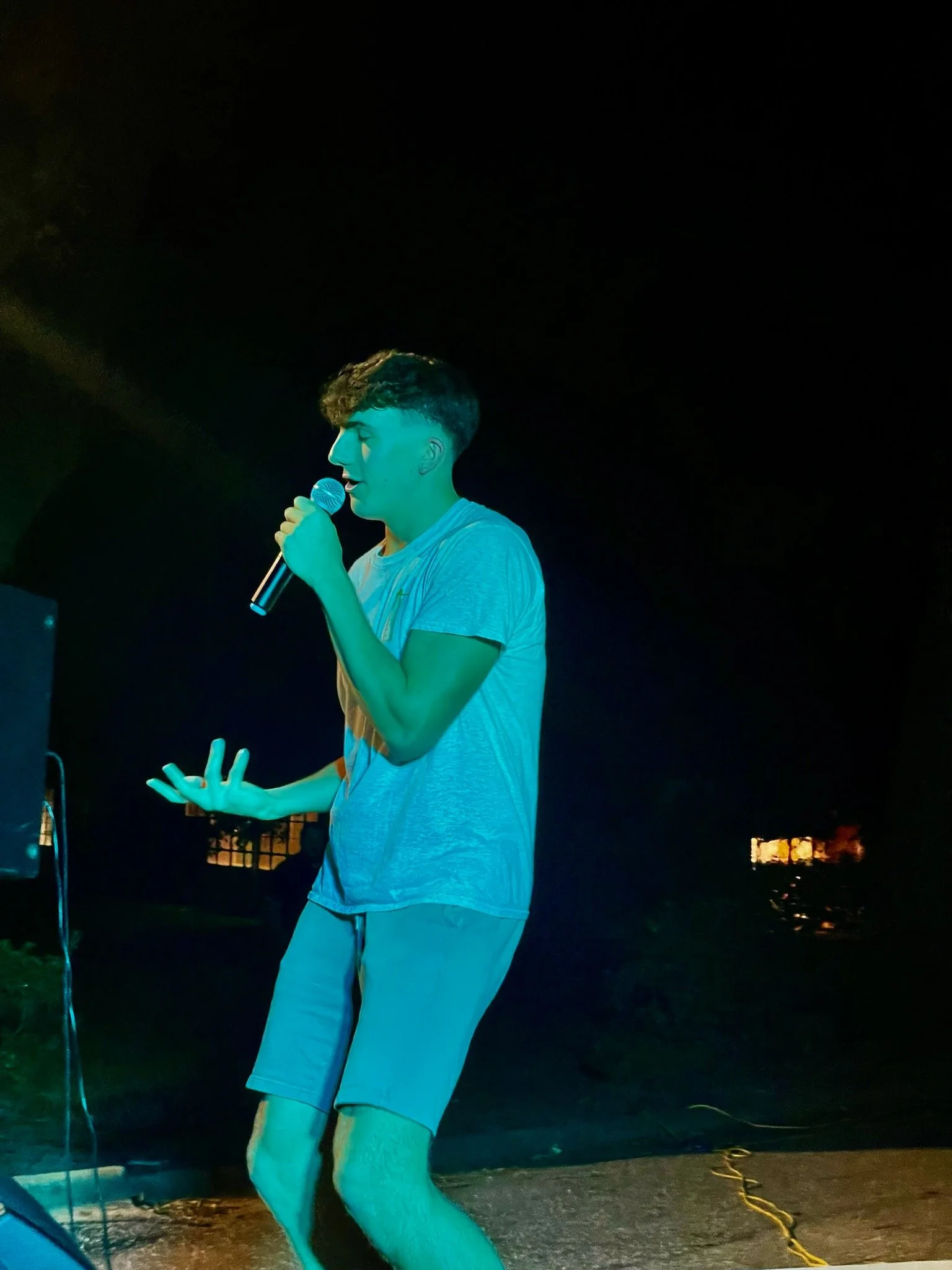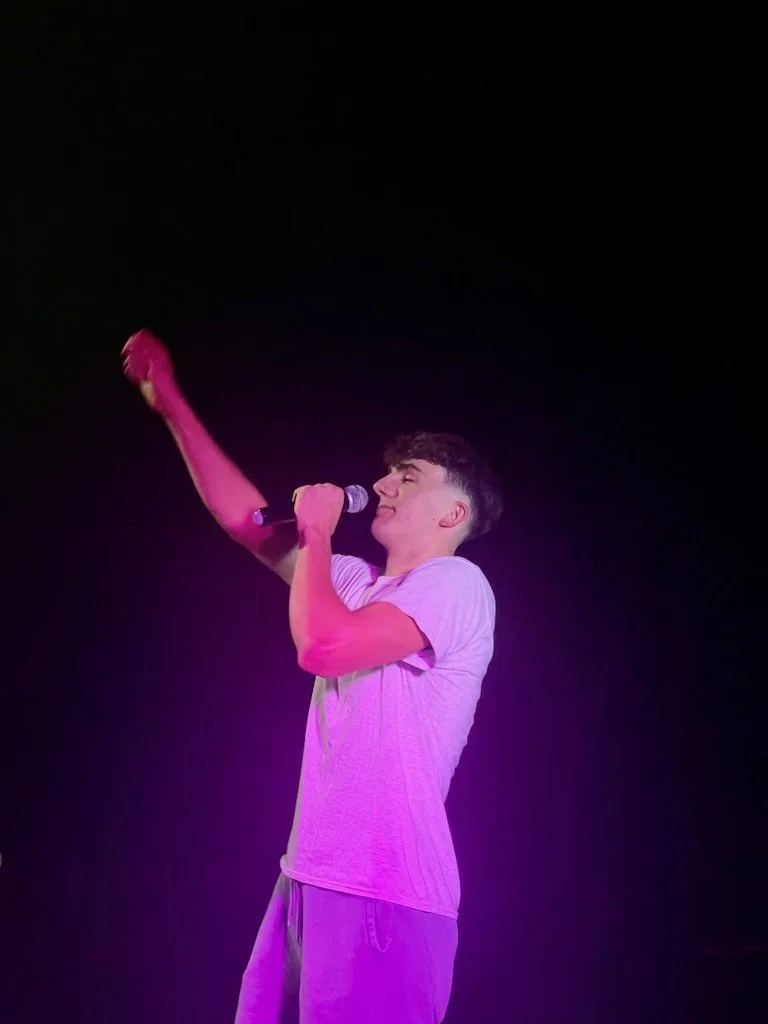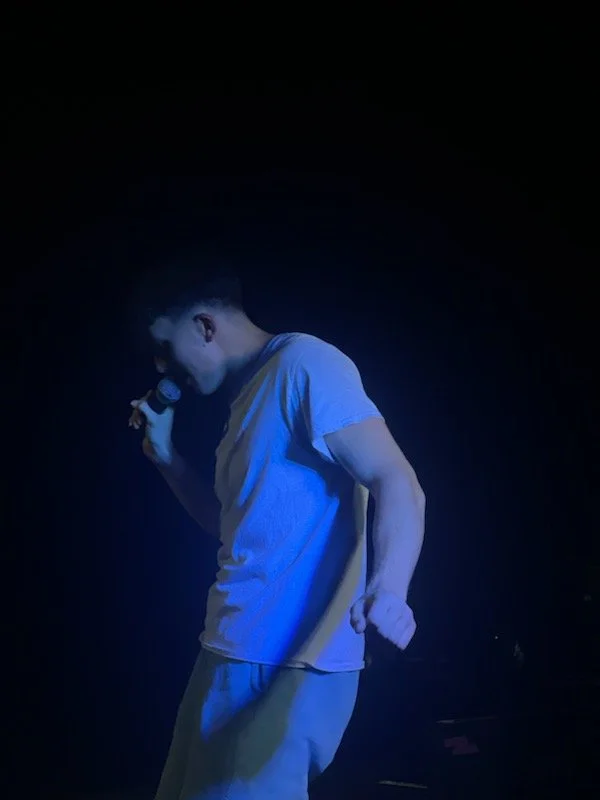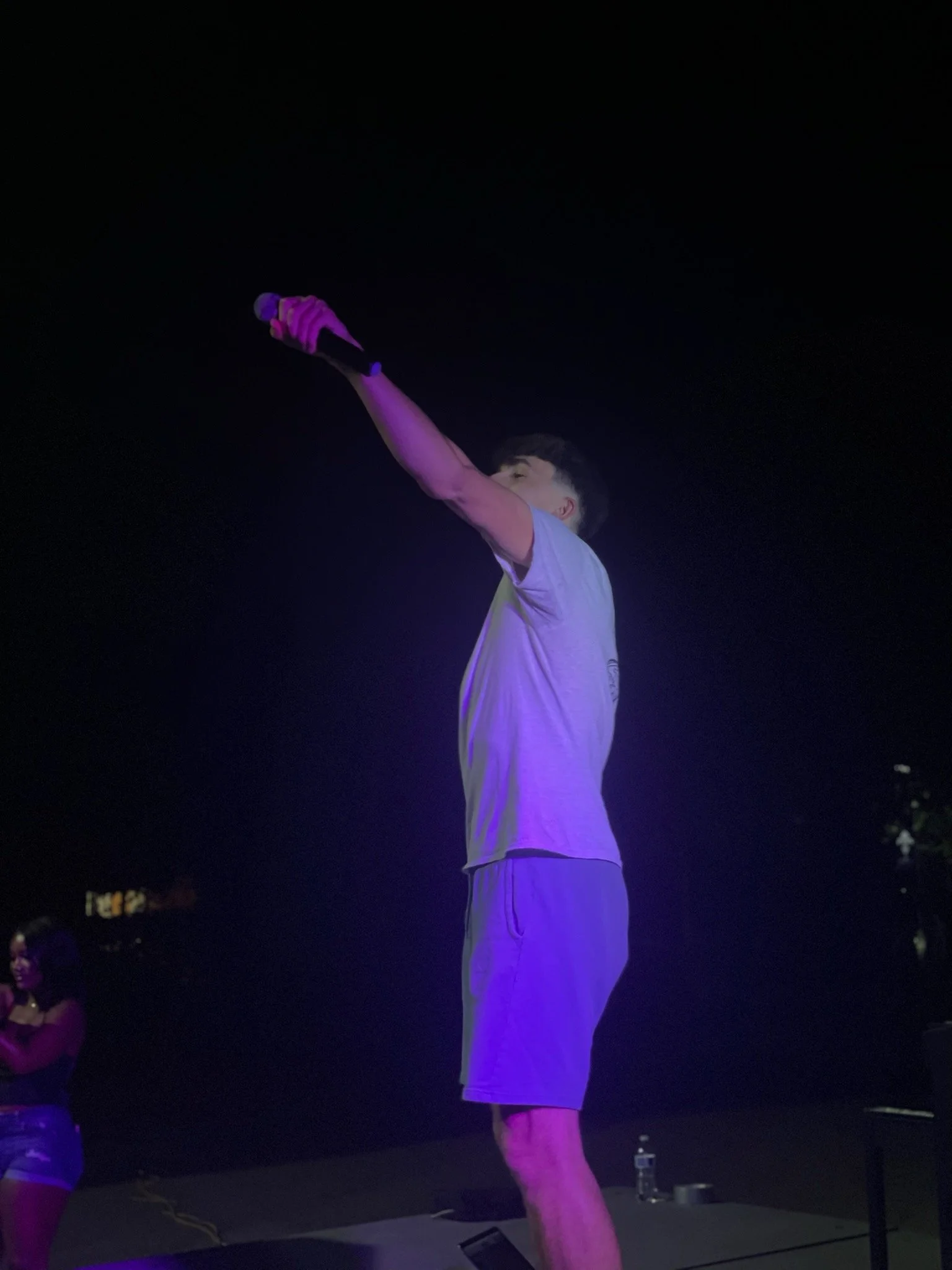Musician mixes genres
Quincy Curley, whose handle is Q Steezy, performs. Photos submitted
By Tom Victoria
Quincy Curley is a rapper and piano man. He’s making moves to fulfill his creative urges by producing music that incorporates multiple genres.
The college student savors being a musician.
“It just opens you to this whole other existence,” he said. “I really enjoy how magical some moments are in the creative process and the benefits of seeing how other people interact with your content. But the creative process, if you don't love that, then there's no point in doing it. And I really love it.”
Quincy, 21, explained his style.
“My music, my lyrics at least, are a combination of funny anecdotes and motivational perspectives,” he said. “I get the funny anecdotes from being a college student and enjoying life. You're only young and youthful once. But then there's also a large side of me that's very motivated for the future and through sports and academics. Other college students can really relate to that.”
Quincy tries to stand out, especially in a flooded rap market.
“Things that I'm trying are incorporating the piano and showing that this guy's rapping and playing the piano,” he said. “I'm from the southernmost part of Louisiana closest to the Gulf of Mexico area. I've really grown to enjoy soul music a lot. My raspy voice mixed with that searching for some soul sounds in some of my songs and then also the college funny anecdotal lyrics, that's what will make me stand out.”
Quincy incorporated traditional singing to his music to supplement the rap.
“I took a vocal class last year at this time, and it made a huge difference,” he said. “I still try those strategies and practices to maintain my vocal quality, although I know it definitely needs some improving. But there's also some art not being totally perfect with the vocal cords. To still maintain the South Louisiana sound or just how you naturally sound is sometimes the best part of the art.”
Quincy’s most recent work was a compilation.
“It's a project of six songs,” he said. “It's called Blue Levee and the first track is named Springhilla, which is a commemoration of my college and it's with a fellow artist on campus. The college is Spring Hill College in Mobile, Alabama. I created a concert to celebrate musically inclined students at my college. We called it Springhilla as a reference to Coachella.”
Quincy finds musical inspiration in life.
“Sometimes, the best stuff just hits you,” he said. “Many of my songs that I have are a true story. Most of what I write about is convenient because it actually happened. It also puts more purpose in the way I deliver the lyrics and how the lyrics happen a lot.”
Quincy also writes about things that didn’t happen to him.
“One song is called Paranoid,” he said. “It is a song about the Mardi Gras festivities in New Orleans. It's not a true story. I detail getting robbed at Mardi Gras. I've never gotten robbed, but I just wanted to have a cool story like that. Another one is the Open the Gate song, perhaps my best written song. Essentially, he's going to dispose of his mom's heroine in the song. But that is not a true story. People have asked me if my mom's on heroin.”
Quincy hopes to entertain and reach his audience.
“Throughout many of my songs, there are instances that I hope my audience can laugh at and maybe somewhat relate to.”
Quincy explained the difference to writing melancholy lyrics versus cheery ones.
“You don't need great lyrics for any type of music these days,” he said. “You can get by with generic lyrics as long as the production's good and it's catchy. But I feel with melancholy, people definitely want to hear lyrics that are more well thought out and have patterns and how the words play off of each other, symbolisms. It doesn't take great lyricism to make a happy song. That almost makes it tougher, because you need to have great lyricism. You need to have the best simple words that you can put together. Those songs, because they're so easy to write, are actually tougher.”
Over time, Quincy adjusted to performing before a live audience.
“I've really grown to enjoy it,” he said. “The first time is very nervous. But once you realize what it takes and how independent you are up there. You either love the independency or you don't like it. I've grown to really love it, and that's what made it so fun. You could do anything on stage. Just continuing to find good strategies to keep the crowd engaged is going to be a large part of my performance career.”
Quincy plans to release more music over the winter.
“It's more beneficial to release something shorter than longer,” he said. “But six songs is what I'm going for. I think people would prefer that I release them all at once and give them a chance to listen to them all at once and see how it flows. But to fit the Spotify algorithm, it's better if I do a waterfall release where I drop one song at a time that builds into the album. That's my plan for January.”
Quincy also continues to make music videos and perform live.
“I will have another Springhilla in the latter half of the spring,” he said. “I'll try to have a concert in January to help with the album release.”
Quincy never stops drawing upon life to create music.
“One piano song that I have is called Keep it Movin’ — it's about transitioning from high school into college and into the next stage of life,” he said. “The term keep it moving is not being set on those two stages and understanding that you have to continue forward. The way that I pronounce some parts in that song, like in the hook, I say they ain't coming back. Ain't no going back. The way that I pronounce those parts are remnants of my soulful enjoyment of music.”
Quincy initially kept his songs solely rap or solely singing.
“Especially when I started and I wasn't as diverse,” he said. “In My Prime is a song that is strictly rapping, and I don't really go into a singing mode much. Croatia, Talk Is Cheap, Open the Gate, and then also Keep Movin’ — I sing in those. But those are all piano songs. Of the songs that are rap songs that I sing in, 2 Years is a song that I combine both rapping and singing. 17/17, I go from rapping in the beginning and then a brief moment where I sing to reflect my journaling of developing my growth.”
Quincy cited a major musical influence.
“In the ‘90s and ‘80s, you saw people that would only rap,” he said. “LL Cool J, maybe. But nowadays in particular, Drake really changed the game. What made him stand out was how he's rapping and then would turn into an R&B singer mid-song and then go back to rapping and have great lyrics and great production. Drake is a big influence.”
Quincy said a singer’s voice impacts his or her music.
“There are songs that and lyrics that I made that I think are only fitting to my voice,” he said. “The lyrics that you come up with are dependent on your style and your voice. I would never consider making a lyric that Playboi Carti might make that is fitting to his voice and his style.”
Quincy was motivated to make music in part to make connections.
“If you make music, it will garner attention towards you,” he said. “You'll have an easier way of making friends and making connections and change your life in ways like that. There are people I've met that I wouldn't have met without making music, and not just people outside of my college, but friends at college that will walk up and say I heard your song.”
But Quincy was destined to make music regardless.
“I've always enjoyed music,” he said. “It's been a big part of my family. My name's Quincy because of Quincy Jones. There's clips of me doing stuff as a kid with music, and I played the piano since I was a kid.”
Rap came into play for Quincy later.
“What actually got me into it was being on the Xbox with a buddy of mine,” he said. “In high school, we were both big fans of rap as typical high schoolers are. We'd be freestyling or just saying goofy lyrics on the mic. One other friend made a beat and I made a song on it.”
The tedium of yard work also resulted in lyric writing for Quincy.
“You obviously have to do it a lot in Louisiana,” he said. “I'd be cutting 10 yards a week, and I wouldn't set aside time to write lyrics. But when I'd be cutting grass, I needed something to think about. The music always would replay in my head wherever I was at previously with a lyric. I'd finish the song every time I'd cut grass. The lyrics would just continue in my head and I think of something and think of something. After a while, I'd worry that somebody had been seeing me singing as I was cutting the grass or talking to myself looking like a crazy person.”
Quincy began to use virtually anything that happened during the day to make music.
“If something happens to you on a daily basis, you just turn that into a hook or a couple bars,” he said. “Anytime something like that happens, I write it down in my notes. When I get a second, I look at all that and I turn it into a song.”
Piano is Quincy’s instrument of choice.
“I tried to learn guitar,” he said. “Guitar is much tougher than the piano, so I've really just stuck to piano. I love the piano. I play it all the time, and you'll see in some of my content that I've play songs like The Long and Winding Road by the Beatles or Thunder Road by Bruce Springsteen.”
Quincy recalled the first time an artist impacted him as a youth.
“Michael Jackson, the first time I heard Billie Jean,” he said. “My dad would play a lot of music. My family would take trips to Isla Mujeres, Mexico. The feeling of listening to Damian Marley and Stephen Marley and Bob Marley on a Mexico beach is perhaps the most nostalgic feeling I have. James Brown in a living room and dancing to him is nothing like that, man.”
A contemporary singer/songwriter is one of Quincy’s current inspirations.
“My favorite artist is Jason Isbell,” he said. “He's a country music artist. His lyricism is out of this world. I think he's the greatest artist ever.”
Quincy also is an athlete, playing hoops and running for his college.
“I play on the second basketball team at Spring Hill College,” he said. “There's the main one and then another team. I also run track. I'm hopefully going to do the decathlon this year, and I am ranked second in the second rank for the triple jump record at my school. I'm a meter off of the guy who's in first place of all time at our school, but I'm trying to break it this year.”
Quincy uses a studio near his campus.
“I'm dependent on a recording studio off campus about 12 minutes away,” he said. “I've bonded with an engineer, and that's how I made most of my songs. I've really tried to get a studio on campus over here, and hopefully we have one after our upcoming fall break.”
Although Quincy wants his music to be successful, he’s pursuing an office career.
“After college, I'll have to put my music efforts to the side potentially with chasing a career goal,” he said. “I'd like to be a financial consultant right after college. I'm majoring in healthcare management, so I'll have financial consultancy and healthcare management. I don't know how much time I'll have for the music, and I don't know if it'll be beneficial at all to continue to pursue it out the gate like that. But with my spare seconds, I'll definitely continue because it is a passion of mine.
Quincy is cognizant of the promotional aspects to music.
“When you start, you see how other people can blow up instantly, and it seems like that can be me, too,” he said. “But you don't realize how tough the lottery is to hit. The way the algorithm is, sometimes somebody just blows up and it just happens like that, and you're like I can do it, too, if he can. And then you end up wasting your time by not putting all your effort into it. It's definitely tough with how saturated it is. But I'm really going to be working on many promotional aspects.”
Quincy stressed the importance of self-promotion.
“You can have talent,” he said. “You can have the right production, the right attitude, you can have the right promotion, but the right promotion comes with money. Just being able to be seen comes with money. You definitely have to have your music correct, and you have to have a good personality, but you have to have good content and you definitely need to have some money in today's world to promote it on social media.”
Quincy doesn’t need extra motivation.
“You really don't have to stay motivated on something that you love,” he said. “I can't help but think of lyrics or think of how certain beats will fit with the lyrics and who will interact with my music. It filters through my head all the time.”
Quincy recommends artists develop good practices.
“Meditation is a big thing that affects my performance,” he said. “Your mind will play tricks on you when it comes to having confidence with releasing art to friends and family.”
Quincy said aspiring musicians should have a plan.
“Release one song as a music video,” he said. “Make at least 10 songs and then decide on your best song and make a music video out of it. Record on your own as much as you can in various ways. When you walk into a studio, you go in there off of some experience. You record your song with character that fits the beat, and then you make a music video. And now you have a music video that shows you, shows your music, gets your fans, and then you make an album.”
Quincy’s YouTube channel: https://www.youtube.com/@QSteezy/featured
Quincy’s Instagram: https://www.instagram.com/qsteezy_/







